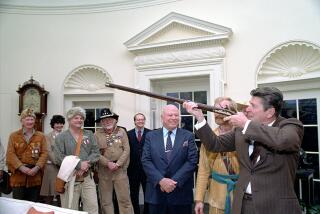COLUMN LEFT / SEYMOUR MELMAN & MARCUS RASKIN : The Money for Economic Fix Is There : Candidates are shunning the D words--depression, demilitarization, democracy.
- Share via
The 1992 election is already being defined, as candidates join in avoiding three prohibited topics: depression, demilitarization and democracy.
The hallmarks of depression are all around. Every large city has shanty towns like the “Hoovervilles” of the 1930s. Real unemployment rates approach 15% and millions are left without income as jobless benefits are used up. Water mains burst, roads and school buildings crumble, libraries are shut down and casualties in underfunded hospitals are a medical scandal. U.S. infant mortality, poverty and illiteracy rates are among the industrialized world’s worst. These conditions mark a major new product of the American economy: a growing castoff population left to be ignored. The present depression is also marked by deindustrialization, as entire American industries have been wiped out, with factories and surrounding communities turned into wasteland.
In the quest for easier and larger profits, managers have cut industrial research and modernization of plant and equipment. There have been no such cuts for the Pentagon, however, whose annual budgets exceed the net profits of all U.S. corporations. Civilian deindustrialization and the Pentagon’s drain on capital resources have produced a tidal wave of U.S. production incompetence, chronic trade imbalance and a shrinking dollar, and have left cities and states without resources for public facilities and services.
Amid this persistent decay, the traditional Keynesian medicine of increased government spending (as for defense) is mainly irrelevant as an antidepressant. Larger consumer purchasing power can have only moderate employment effect, since so much of what we buy is imported. The damage from long neglect to the country’s infrastructure is massive, and repairing it would require a continuing capital outlay of at least $150 billion a year.
But the money is available. That sum is equivalent to the annual U.S. military spending on the North Atlantic Treaty Organization, even though Western Europe no longer confronts a substantial military threat. An additional $82 billion can readily be gotten by reversing Reagan’s lavish tax break to the rich and restoring 1979 income-tax rates. Beyond that, a demilitarization process--orderly and internationally agreed--would release from the budgets of the Pentagon vast resources to rebuild our country.
But no candidate is taking on the military-industrial complex.
About 6 million Americans are employed by the Pentagon and its main contractors. To safeguard their economic futures, demilitarization must be paralleled by economic conversion for the military factories, bases and laboratories. Taking a lesson from the U.S. economy’s adjustment after World War II, and allowing for the special conditions generated by the long Cold War, the principal requirements of a conversion policy become clear.
These must include:
-- Advance planning at each military facility for conversion to civilian markets, so the changeover process can begin as soon as a Pentagon contract is severed.
-- Local authority for organizing conversion at each facility, to avoid ineffectual bureaucratic control from distant Washington.
-- Both management and working people must be enlisted in alternative-use committees, to harness knowledge and commitment for preparing conversion to civilian tasks.
House Resolution 441 by Rep. Ted Weiss (D-N.Y.), contains these and supporting measures.
No presidential candidate has declared a clear position on these issues. In the absence of real choices on vital national policies, the decay will continue and the electorate will be increasingly vulnerable to ultranationalist and racist demagogues.
At stake here is no abstract principle of political philosophy. Democracy ceases to function when politicians evade critical issues, when unyielding political institutions earn wholesale distrust and when government fosters unbridgeable economic inequality.
The 1992 election choices will be serious only if political parties debate plans for escaping depression and militarism, and heed the people who have long been deprived of competent public services. That is essential for securing real political freedom in the United States.
More to Read
Get the L.A. Times Politics newsletter
Deeply reported insights into legislation, politics and policy from Sacramento, Washington and beyond. In your inbox twice per week.
You may occasionally receive promotional content from the Los Angeles Times.










